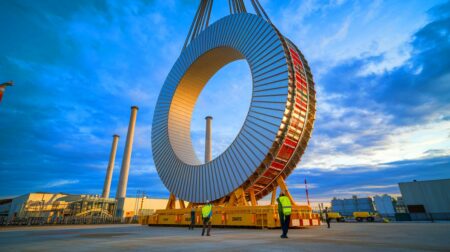It didn’t take long for fracking operations at a Cuadrilla site in the UK, restarted just two weeks ago, to be shut down yet again because of the earthquakes affecting the neighborhood.
“This is the third time Cuadrilla have had to stop fracking,” said Gordon Marsden, the MP for the area. “As the tremors steadily increase, so does the distress and worry to local people.” Indeed, a 2017 research study describes a “collective trauma” to residents exposed to fracking in Lancashire.
Here’s why: Cuadrilla is a British firm operating a fracking site at Preston New Road. The process for extracting shale gas and oil is controversial in much of the world, especially as renewable energy alternatives overtake the reliance on fossil fuels. The story was no different in Lancashire, where an organized resistance to the company and its injection technique was successful until 2016. Those battles followed earlier challenges because of earthquakes dating back to 2011.
Cuadrilla, the only licensed British operator to date, had to stop because those earthquakes near the Blackpool site in Lancashire were believed to be caused by the fracking. Seismic activity registering 1.5 and 2.3 magnitude on the Richter scale was enough to require further study that found it likely that the quakes were caused by shale drilling operations, and for the British government to agree on stricter monitoring rules.
Local residents and their council opposed any Cuadrilla fracking restart in Lancashire – as did nearly 200,000 people who support a Friends of the Earth initiative, and other groups working to prevent it. They say they object to the water resources and chemicals used in fracking as much as the earthquakes.
Some residences are just 300 meters from the fracking site, says the Preston New Road Action Group.
Yet in 2016, Westminster overturned the local autonomy on the Cuadrilla decision and allowed the company to continue its exploratory drilling for natural gas deposits in the shale, leaving residents feeling powerless. Cuadrilla agreed to comply with a seismic warning system based on the traffic light model, with a “red light” assigned to any seismic activity of 0.5 magnitude or greater requiring that work be stopped for an assessment.
A Lancashire resident filed a legal challenge in early October requesting an injunction over emergency planning procedures at the site but it was turned down and operations resumed on October 15. Yet as soon as it started, the seismic activity that had fallen silent began again. By October 26, there had been 17 small earthquakes at the Lancashire site when one finally exceeded the 0.5-magnitude threshold. That means that Cuadrilla has to stop for at least 18 hours, at what the company says is a cost of £94,000 per day for delays.
By October 29, the company recorded a 1.1-magnitude quake. “This will be classed as a ‘red’ event as part of the traffic light system operated by the Oil and Gas Authority but as we have said many times this level is way below anything that can be felt at surface and a very long way from anything that would cause damage or harm,” the company said in its statement. They announced another 18-hour pause.
The company initially planned a three-month window for the exploratory operations followed by flow testing in early 2019, but it remains to be seen if those timeline goals are achievable with all of the quake-related interruptions. Cuadrilla remains proud of its operation and touts the benefits to the Lancashire economy, with what it says is more than £10 million invested in its “Lancashire First” plan.
The company released a study that shows background seismicity routinely exceeds the agreed-upon fracking threshold, and launched a data site for public monitoring of the earthquakes. Yet there’s one thing that remains unshaken for many Lancashire residents: the resistance to fracking operations, and to fossil fuels themselves in the critical fight against climate change.
Did you like it? 4.4/5 (27)









